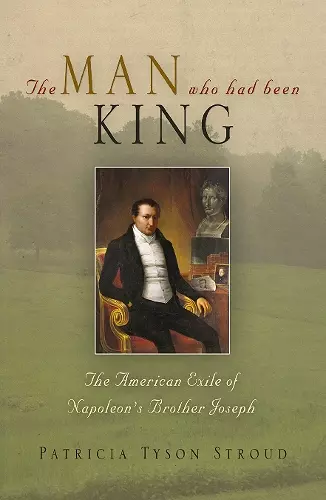The Man Who Had Been King
The American Exile of Napoleon's Brother Joseph
Format:Hardback
Publisher:University of Pennsylvania Press
Published:13th May '05
Currently unavailable, and unfortunately no date known when it will be back
This hardback is available in another edition too:
- Paperback£27.99(9780812225167)

In The Man Who Had Been King, Patricia Tyson Stroud provides a rich account of the life of Napoleon's brother Joseph Bonaparte in the United States, detailing how his palatial estate, gardens, and art collection made him a key figure in the importation of European taste to America.
Joseph Bonaparte, King of Naples and Spain, claimed that he had never wanted the overpowering roles thrust upon him by his illustrious younger brother Napoleon. Left to his own devices, he would probably have been a lawyer in his native Corsica, a country gentleman with leisure to read the great literature he treasured and oversee the maintenance of his property. When Napoleon's downfall forced Joseph into exile, he was able to become that country gentleman at last, but in a place he could scarcely have imagined.
It comes as a surprise to most people that Joseph spent seventeen years in the United States following Napoleon's defeat at Waterloo. In The Man Who Had Been King, Patricia Tyson Stroud has written a rich account—drawing on unpublished Bonaparte family letters—of this American exile, much of it passed in regal splendor high above the banks of the Delaware River in New Jersey.
Upon his escape from France in 1815, Joseph arrived in the new land with a fortune in hand and shortly embarked upon building and fitting out the magnificent New Jersey estate he called Point Breeze. The palatial house was filled with paintings and sculpture by such luminaries as David, Canova, Rubens, and Titian. The surrounding park extended to 1,800 acres of luxuriously landscaped gardens, with twelve miles of carriage roads, an artificial lake, and a network of subterranean tunnels that aroused much local speculation.
Stroud recounts how Joseph became friend and host to many of the nation's wealthiest and most cultivated citizens, and how his art collection played a crucial role in transmitting high European taste to America. He never ceased longing for his homeland, however. Despite his republican airs, he never stopped styling himself as "the Count de Survilliers," a noble title he fabricated on his first flight from France in 1814, when Napoleon was exiled to Elba, nor did he ever learn more than rudimentary English. Although he would repeatedly plead with his wife to join him, he was not a faithful husband, and Stroud narrates his affairs with an American and a Frenchwoman, both of whom bore him children. Yet he continued to feel the separation from his two legitimate daughters keenly and never stopped plotting to ensure the dynastic...
"Were he in Joseph's shoes, Napoleon told a visitor, 'I would found a great empire of all Spanish America.' But Joseph will 'spend his fortune in making gardens.' Napoleon knew his brother. Stroud describes how the elder Bonaparte made Point Breeze, an estate on the Delaware River in New Jersey, a showcase for its grounds and for its art collection, shipped from Europe."-Chronicle of Higher Education "The book dwells on the seventeen years Joseph Bonaparte spent in the United States... On American shores Joseph may have lived the happiest years of his life, the life of a good-natured and learned country squire, free from the obligation to lend a hand to the making of history. Thanks to Patricia Tyson Stroud's extensive research and fluid narrative American readers will be glad to make the acquaintance of Napoleon's older brother."-Pennsylvania Magazine of History and Biography
- Winner of Winner of the 2006 New Jersey Council for the Humanities Annual Book Award 2021
- Winner of Winner of Second Prize in the 2005 book competition of the International Napoleonic Society 2021
ISBN: 9780812238723
Dimensions: unknown
Weight: unknown
296 pages